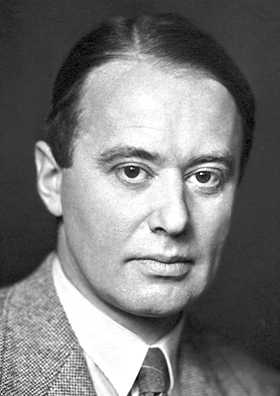Arne Tiselius
| Arne Tiselius | |
|---|---|
 | |
| Born |
Arne Wilhelm Kaurin Tiselius August 10, 1902 Stockholm, Sweden |
| Died |
29 October 1971 (aged 69) Uppsala, Sweden |
| Residence | Sweden |
| Nationality | Sweden |
| Fields | Chemistry |
| Institutions | University of Uppsala |
| Alma mater | University of Uppsala |
| Known for | Electrophoresis |
| Notable awards |
Nobel Prize for Chemistry (1948) Franklin Medal (1955) Fellow of the Royal Society (1957)[1] |
Arne Wilhelm Kaurin Tiselius (10 August 1902 – 29 October 1971) was a Swedish biochemist who won the Nobel Prize in Chemistry in 1948 "for his research on electrophoresis and adsorption analysis, especially for his discoveries concerning the complex nature of the serum proteins."[1][2][3][4][5][6][7][8][9][10][11]
Education
Tiselius was born in Stockholm. Following the death of his father, the family moved to Gothenburg where he went to school, and after graduation at the local "Realgymnasium" in 1921, he studied at the University of Uppsala, specializing in chemistry.
Career
Tiselius became a research assistant at Theodor Svedberg's laboratory in 1925 and obtained his doctor's degree in 1930 on the moving-boundary method of studying the electrophoresis of proteins. From then to 1935 he published a number of papers on diffusion and adsorption in naturally occurring base-exchanging zeolites, and these studies continued during a year's visit to H.S. Taylor's laboratory in Princeton with support of a Rockefeller Foundation fellowship. On his return to Uppsala he resumed his interest in proteins, and the application of physical methods to biochemical problems. This led to a much-improved method of electrophoretic analysis which he refined in subsequent years.
Tiselius took an active part in the reorganization of scientific research in Sweden in the years following World War II, and was President of the International Union of Pure and Applied Chemistry 1951-1955. He was Chairman of the Board for the Nobel Foundation 1960–1964.[12]
Personal life
Tiselius was married, with two children. He died of a heart attack 29 October 1971 in Uppsala. His wife died in 1986.
Awards and honours
The lunar crater Tiselius was named in his honour.
References
- ↑ 1.0 1.1 Kekwick, R. A.; Pedersen, K. O. (1974). "Arne Tiselius 1902-1971". Biographical Memoirs of Fellows of the Royal Society 20: 401–428. doi:10.1098/rsbm.1974.0018. PMID 11615762.
- ↑ Kyle, R. A.; Shampo, M. A. (2005). "Arne Tiselius--father of electrophoresis". Mayo Clinic proceedings. Mayo Clinic 80 (3): 302. PMID 15757008.
- ↑ Tiselius, A. (1937). "A new apparatus for electrophoretic analysis of colloidal mixtures". Transactions of the Faraday Society 33: 524–1933. doi:10.1039/tf9373300524.
- ↑ A Tiselius (1930). "The moving-boundary method of studying the electrophoresis of proteins". Nova Acta Regiae Societatis Scientiarum Upsaliensis. Ser. IV, Vol. 7 (4).
- ↑ Tiselius, A. (1968). "Reflections from Both Sides of the Counter". Annual Review of Biochemistry 37: 1–24. doi:10.1146/annurev.bi.37.070168.000245. PMID 4875715.
- ↑ Putnam, F. W. (1993). "Alpha-, beta-, gamma-globulin--Arne Tiselius and the advent of electrophoresis". Perspectives in biology and medicine 36 (3): 323–337. PMID 7685077.
- ↑ Kay, L. E. (1988). "Laboratory technology and biological knowledge: The Tiselius electrophoresis apparatus, 1930-1945". History and philosophy of the life sciences 10 (1): 51–72. PMID 3045854.
- ↑ Hjertén, S. (1973). "Dedication to Professor Arne Tiselius". Annals of the New York Academy of Sciences 209: 5–7. doi:10.1111/j.1749-6632.1973.tb47513.x. PMID 4577171.
- ↑ Hertén, S. (1972). "Arne Tiselius. 1902-1971". Journal of ultrastructure research 39 (5): 624–628. doi:10.1016/S0022-5320(72)90126-8. PMID 4556330.
- ↑ Hjertén, S. (1972). "Arne Tiselius 1902-1971". Journal of chromatography 65 (2): 345–348. PMID 4552643.
- ↑ http://www.nobelprize.org/nobel_prizes/chemistry/laureates/1948/
- ↑ http://www.nobelprize.org/nobel_organizations/nobelfoundation/history/lemmel/index.html
External links
- Nobel Lecture Electrophoresis and Adsorption Analysis as Aids in Investigations of Large Molecular Weight Substances and Their Breakdown Products from Nobelprize.org website
- Biography Biography from Nobelprize.org website
| Non-profit organization positions | ||
|---|---|---|
| Preceded by Birger Ekeberg |
Chairman of the Nobel Foundation 1960–1964 |
Succeeded by Bertil Lindblad |
| ||||||||||||||||||||||||||||
|
